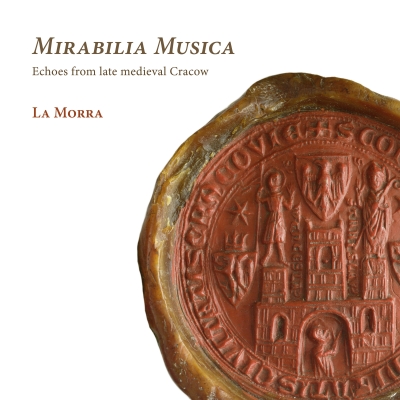Mirabilia Musica. Echoes From Late Medieval Cracow
Mirabilia Musica. Echoes From Late Medieval Cracow

Choose quality
Studio Master (192) FLAC
- Studio Master (192) ALAC
- Studio Master FLAC
- Studio Master ALAC
- CD Quality FLAC
- CD Quality ALAC
- MP3
- Breve regnum erigiturComposer(s) AnonymousArtist(s) La Morra
Breve regnum erigitur
04:02$2.30 - Ave maris stellaComposer(s) AnonymousArtist(s) La Morra
Ave maris stella
03:37$2.30 - Postaris in presepio / Maria amplioribusComposer(s) AnonymousArtist(s) La Morra
Postaris in presepio / Maria amplioribus
03:12$2.30 - Maria en mitissimaComposer(s) AnonymousArtist(s) La Morra
Maria en mitissima
02:13$2.30 - Salve thronus trinitatisComposer(s) AnonymousArtist(s) La Morra
Salve thronus trinitatis
01:19$2.30 - Sancta Maria succurre / MagnificatComposer(s) Mikołaj RadomskiArtist(s) La Morra
Sancta Maria succurre / Magnificat
10:11$3.40 - BalatumComposer(s) Mikołaj RadomskiArtist(s) La Morra
Balatum
02:00$2.30 - Cracovia civitasComposer(s) AnonymousArtist(s) La Morra
Cracovia civitas
04:44$2.30 - Sanctus: Gustati necis poculaComposer(s) Jacobus de ClibanoArtist(s) La Morra
Sanctus: Gustati necis pocula
03:41$2.30 - Nitor inclite claredinisComposer(s) NicolausArtist(s) La Morra
Nitor inclite claredinis
03:38$2.30 - Virginem mire pulchritudinisComposer(s) AnonymousArtist(s) La Morra
Virginem mire pulchritudinis
03:38$2.30 - Presulis eminenciamComposer(s) Petrus Wilhelmi de GrudenczArtist(s) La Morra
Presulis eminenciam
01:39$2.30 - Gloria (Ad ongni vento)Composer(s) Zacara da TeramoArtist(s) La Morra
Gloria (Ad ongni vento)
05:17$2.30
Total running time: 60 minutes.
Album information
La Morra presents a musical panorama of fifteenth-century Cracow. Six centuries later, it still enchants with its medieval-renaissance aura.
The city of Cracow, until 1596 the political, commercial and cultural capital of Poland, rose to prominence in Central Europe in the course of the fourteenth and fifteenth centuries under the rule of the Jagiellon dynasty. Although repertoire both performed and composed in Cracow exists from before to that period, it is the manuscripts from the first half of the fifteenth century that capture an impression of the city’s soundscape in a period when it was reportedly “gripped by the greatest enthusiasm” for music. On the one hand, they reveal an intense involvement with Italian and French art music, and on the other, rare glimpses of local musical production ranging from simple, often archaic-sounding polyphony to more complex works of Mikołaj Radomski, a mysterious Polish composer whose music is not known from other sources.




